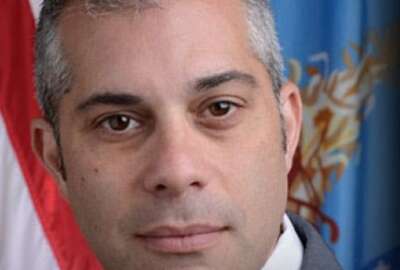White House to initiate paid internship program for the first time ever this fall
In today's Federal Newscast, this fall, the White House will have paid internships for the first time ever.
To listen to the Federal Newscast on your phone or mobile device, subscribe in PodcastOne or Apple Podcasts. The best listening experience on desktop can be found using Chrome, Firefox or Safari.
- New recommendations are out for how security clearance holders can move between contracts and agencies. The Intelligence and National Security Alliance says delays in personnel clearance mobility are hindering both government and industry. INSA says the Defense Department should assign a lead official to fix the issue across components. The industry group also recommends giving contractors expanded access to clearance repositories so they can evaluate their staff members’ eligibility for contracts.
- This fall, the White House will have paid internships for the first time ever. The funding to pay White House interns comes from bipartisan legislation that President Joe Biden signed earlier this year. The administration says paying interns will reduce barriers for low-income students and first-generation professionals, so they can take on federal internships. The hope is for paid opportunities to improve diversity of those who receive offers. The first cohort of paid interns will start this fall, and will work in person at the White House.
- Applications for the next round of Presidential Innovation Fellows are open now through June 24. The Presidential Innovation Fellows program assigns participants to work at agencies developing mission-driven solutions in areas of Data Strategy and Artificial Intelligence, Product, Design and Experience, Digital Transformation and Strategy, or Software and Cloud Infrastructure. The Program operates within GSA’s Technology Transformation Services. 2023 fellows begin their stint in April and are considered GS-15s. They are paid the Step 1 salary plus they receive all the usual federal employee benefits.
- Another billion dollar IT modernization contract is getting closer to being up for bid. The IRS is creating a new contract to support its IT modernization program that focuses on software development and support services. The tax agency released the draft solicitation for its Enterprise Development Operations Services or EDOS vehicle. The IRS says EDOS will be a blanket purchase agreement that sits on top of the GSA schedule. The contract has a $2.6 billion ceiling over the potential seven year life of the vehicle. The 10 focus areas of the contract include agile portfolio management support, enterprise services and managed services. The IRS is holding an industry day on June 8 and feedback on the draft solicitation is due by July 20.
- The General Services Administration is putting out a call for a new chief technology officer. This person will oversee the development of new technology and the adoption of emerging and breakthrough technologies. The CTO’s goals include improving delivery of user-centered products and modern software development practices, building GSA digital services capabilities and collaborating across GSA’s senior executive leadership team to advance the usability and usefulness of technology products and services. Navin Vembar was GSA’s last permanent CTO. He left in 2018 and deputy CIO Beth Killoran has been the acting CTO since then. The agency is holding an information session for potential applicants on June 17.
- The Transportation Department has a new CFO after a round of recent Senate confirmations for the department. Victoria Wassmer is confirmed as Transportation’s chief financial officer and assistant secretary for budget and programs. Other confirmations include National Highway Traffic Safety Administrator Steven Cliff, retired Rear Adm. Ann Phillips as Maritime Administrator, Mohsin Syed as assistant secretary for governmental affairs, Christopher Coes as Assistant Secretary for Transportation Policy, and Carol “Annie” Petsonk as Assistant Secretary for Aviation and International Affairs. John Putnam is also confirmed as general counsel for the department.
- The Transportation Security Administration uses small-scale testing for modernization. TSA’s “innovation task force” first considers many of its tech developments, such as a facial biometrics pilot, at just a handful of airports. TSA’s enterprise and data lead, Mike Karas, says starting small can better and more securely lead to modernization. “Sometimes the demonstration may actually occur in one lane, in one checkpoint, in one airport. It depends on how ready that specific technology is. From there, we may continue further and eventually that could turn into a potential acquisition program.”
- USDA wants to shore up the nation’s food supply chain after years of back-to-back challenges exposed just how vulnerable suppliers and processors are. Agriculture Secretary Tom Vilsack announces a new Food System Transformation Framework intended to expand access to USDA loan programs for smaller and disadvantaged farmers. It would also help with investments in sustainable agriculture, improve federal school and child nutrition programs, reduce costs passed onto consumers, and promote equity in agriculture. USDA plans to use $25 million to improve SNAP technology and $25 million for technical assistance to meat and poultry processing facilities.
- One agency is looking to move quickly with new a cyber incident reporting law. The Cybersecurity and Infrastructure Security Agency is setting an aggressive pace for publishing new cyber incident reporting rules for critical infrastructure companies. The agency has two years to publish a rule, but CISA’s Brandon Wales says it will start looking for feedback from industry and others soon. “Obviously we’re going to try to move a little bit more quickly than that, but anyone who’s been through the rulemaking process knows that it is neither fun nor fast are easy,” Wales said. “And so we’ll be working on that pretty aggressively for the next few years.”
- The Air and Space Forces are hosting a hackathon this summer focused on building emergent weapons capabilities. The events goals are to validate rapid development in a cloud environment across multiple bases, departments and classifications and to find a new way for companies and employees to develop capabilities. Applications are now open and the event will kick off in mid-July.
- After a kerfuffle over the location of U.S. Space Command’s headquarters, a government watchdog says the Air Force needs better ways to decide where it will base its future installations. The Government Accountability Office says the Air Force needs definitive guidance for future strategic basing decisions to avoid political tussles. The report found that in deciding where to locate U.S. Space Command, the Air Force failed to use many of the best practices that would keep the choice unbiased and credible. The drama over the headquarters’ location started after the service said it would move SPACECOM from Colorado to Alabama. Many lawmakers alleged foul play from the Trump administration, however, those claims were not fully substantiated by an inspector general investigation.
- The Veterans Affairs Department is offering up to 75 grants annually to entities looking to enhance the provision of legal services for veterans experiencing or at risk for homelessness. These grants come after VA published an interim final rule on Wednesday. At least 10% of the funding will be utilized for women veterans. VA Secretary Denis McDonough said that providing access to legal services for veterans takes interagency partnerships at all levels of government. The notice of funding opportunity and instructions on how to apply for a grant are expected to be published in September.
- A federal appeals court finds the Postal Service isn’t required to grant a religious exemption to employees who don’t want to work Sundays. The 3rd U.S. Circuit Court of Appeals rules against a former rural mail carrier in Pennsylvania. He accused USPS of violating federal anti-discrimination law by failing to accommodate his religious practices, when supervisors didn’t grant him a blanket exemption from working on Sundays. The court found the exemption would have put an undue burden on USPS and employees who would have to cover his shifts. USPS doesn’t deliver mail on Sundays, but it does deliver packages. The ruling upheld a 2021 decision by a federal judge dismissing the lawsuit.
- More than 5,400 Postal Service employees sustained dog bites while on the job last year. That’s about 200 fewer incidents than what USPS reported in 2020. Cleveland, Ohio saw more incidents than any other city in the U.S. with a total of 58 dog bites last year. Houston, Texas came in at a close second with 54 cases. Kansas City, Missouri ranked third with 48 cases. USPS is releasing its statistics as part of National Dog Bite Awareness Week.
Copyright © 2025 Federal News Network. All rights reserved. This website is not intended for users located within the European Economic Area.
Eric White
Eric White is news anchor and Federal Drive producer at Federal News Network.
Follow @FEDERALNEWSCAST
Related Stories
Related Topics





